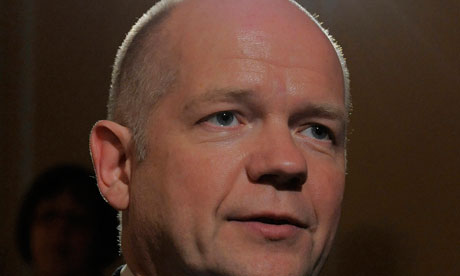
Whislt I agree that c
China has penetrated the Foreign Office's internal communications in the most audacious example yet of the growing threat posed by state-sponsored cyber-attacks, it emerged tonight.
William Hague told a security conference in Munich that the FO repelled the attack last month from "a hostile state intelligence agency". Although the foreign secretary did not name the country behind the attacks, intelligence sources familiar with the incidents made it clear he was referring to China. The sources did not want to be identified because of the sensitive nature of the issue.
In his speech Hague was reflecting growing anger and concern within the government about the increasing threat posed by cyber-espionage – states, as well as individuals, using cyberspace to steal defence, diplomatic and commercial secrets.
"It is a new development. The UK is prepared to admit the attacks were state-backed," said Alexander Neill, head of the Asia programme at the Royal United Services Institute thinktank.
The foreign secretary said the FO attack came in the form of an email sent to three of his staff "which claimed to be about a forthcoming visit to the region and looked quite innocent". "In fact it was from a hostile state intelligence agency and contained computer code embedded in the attached document that would have attacked their machine. Luckily, our systems identified it and stopped it from ever reaching my staff," Hague said.
In another attack last year, the foreign secretary said Britain's defence industry was "deliberately" targeted. "A malicious file posing as a report on a nuclear Trident missile was sent to a defence contractor by someone masquerading as an employee of another defence contractor," Hague told an audience of western officials and businessmen. "Security meant that the email was detected and blocked, but its purpose was undoubtedly to steal information relating to our most sensitive defence projects."
Hague admitted that a third attack, apparently criminal, had succeeded in evading Britain's defences, with a version of the Zeus malware widely used to extract banking information and other personal details from targeted computers.
"In late December a spoof email purporting to be from the White House was sent to a large number of international recipients who were directed to click on a link that then downloaded a variant of Zeus," Hague said. "The UK government was targeted in this attack and a large number of emails bypassed some of our filters. Our experts were able to clear up the infection, but more sophisticated attacks such as these are becoming more common."
The foreign secretary said government was spending £650m on its cyber defences against such attacks, and working with the private sector. But he added that the international response was "fragmented and lacks focus".
Speaking to journalists later, Hague said: "We're witnessing an exponential rise in the misuse of cyberspace. In a decade, this could be out of control, and we have to start to do the thinking now."
He said Britain was offering to host an international conference this year aimed at establishing global standards.
"Many countries do not share our view of the positive impact of the internet, and others are actively working against us in a hostile manner," he said.
"However as liberal democracies we also have a compelling interest in supporting democratic ideals in cyberspace, and working to convince others of this vision."
General Sir David Richards, chief of the defence staff, last month said the UK needsed its own Cyber Command, similar to that set by by the US defence department. He said that the advance of cyber technology would lead to a "cultural change" in warfare which the UK must be prepared for."We must learn to defend, delay, attack and manoeuvre in cyberspace, just as we might on the land, sea or air and all together at the same time".